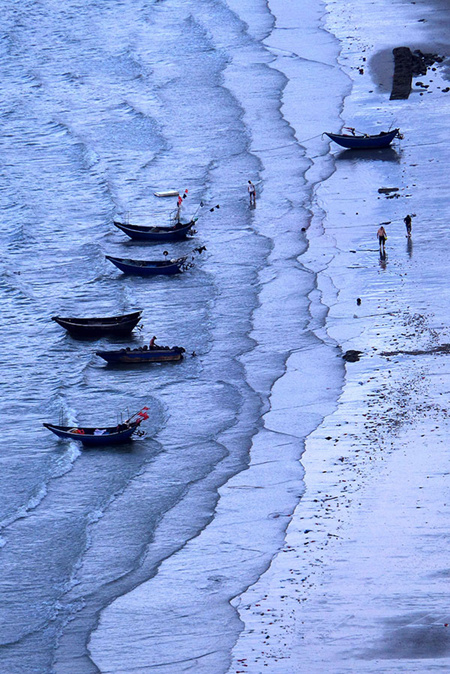Environment is priority on Weizhou Island
 0 Comment(s)
0 Comment(s) Print
Print E-mail China Daily, August 5, 2015
E-mail China Daily, August 5, 2015
 |
|
Fishing boats are made ready to set sail from Weizhou Island in the Guangxi Zhuang autonomous region where many locals are now earning their living from tourism. [Photo/China Daily] |
Weizhou Island in the Guangxi Zhuang Autonomous Region is also known as China's barrier reef. It's the largest and youngest volcano island in the country and has attracted millions of tourists annually in recent years.
As tourism has developed, local residents who once made a living by raising poultry or fishing now have jobs serving visitors. An estimated 16,000 residents on the island work in the tourism industry.
But for Li Binshi, who set foot on Weizhou for the first time last year, the island wasn't impressive. There was no sewage treatment plant at the time, and the island wasn't quiet.
Weizhou consisted of hotels built by local residents and narrow streets thronged by dense crowds of tourists.
An old man who has lived on the island for over 50 years told him that even so many hotels are not enough to accommodate all the tourists who come to the island. The man said he had seen more than 400 tourists sleeping on the beach when no hotels were available in the peak season one year.
"It might be good news for officials who found potential for developing tourism, but not for me," Li said.
Too many people produced trash and sewage. The latter, which was discharged untreated directly into the sea, prompted environmental watchdogs to worry about the coral reefs.
Wang Xiaoqiang, director of the Department of Environmental Protection under the State Oceanic Administration, said overgrowth of algae, caused by increased nitrogen dumped into the sea, cut off sunlight required by coral reefs.
According to Wang, the coral reefs have strict environmental restrictions. Water must be clear so that a maximum amount of sunlight penetrates it. The water quality must meet Level I under national standards, the highest level suitable for protecting rare species of fish.
The water situation is just one aspect of environmental protection on the island, Wang said.
Most of the islands lag behind in infrastructure construction, with inconvenient traffic and poor sewage treatment facilities, according to a report by the administration, the China Oceanic Development Report 2015.
For Li, who is now director of the Administrative Committee of the Weizhou Island Tourism Zone, even though the marine environment was generally healthy at the time, he felt that overheated tourism would be a disaster for an island with no basic environmental protection infrastructure.
From that initial negative impression, Li realized the importance of slowing the pace of tourism development and turning the focus to environmental protection, even if it meant some economic loss.
"If the number of tourists continues to go up with no effort toward protection, every natural resource that could generate revenue will be of no use in the future," Li said last year when he proposed rules that would limit the number of tourists.
Starting in June last year, the maximum number of tourists has been controlled at 7,000 per day, under a plan released by the Beihai city government, which administers Weizhou Island.
But fewer tourists means less revenue. Although one tourist might generate 600 yuan ($96.6) a day, the full loss is hard to measure, according to an official of the tourism zone who asked not to be named.
When asked if it is possible to have strategies that are both green and profitable, Li said that sacrificing short-term revenue might be the only option. "A win-win strategy is only possible when basic environmental protection infrastructure has been built," he said. "But we are starting from zero."






Go to Forum >>0 Comment(s)